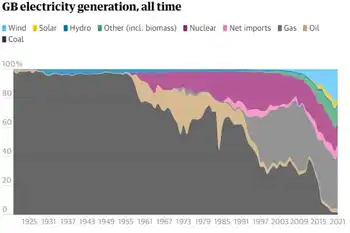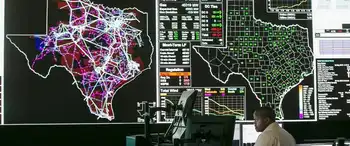Texas Heat Pump Electrification replaces natural gas furnaces with electric heating across ERCOT, cutting carbon emissions, lowering utility bills, shifting summer peaks to winter, and aligning higher loads with strong seasonal wind power generation.
Key Points
Statewide shift from gas furnaces to heat pumps in Texas, reducing emissions and bills while moving grid peak to winter.
✅ Up to $452 annual utility savings per household
✅ CO2 cuts up to 13.8 million metric tons in scenarios
✅ Winter peak rises, summer peak falls; wind aligns with load
What would happen if you converted all the single-family homes in Texas from natural gas to electric heating?
According to a paper from Pecan Street, an Austin-based energy research organization, the transition would reduce climate-warming pollution, save Texas households up to $452 annually on their utility bills, and flip the state from a summer-peaking to a winter-peaking system. And that winter peak would be “nothing the grid couldn’t evolve to handle,” according to co-author Joshua Rhodes, a view echoed by analyses outlining Texas grid reliability improvements statewide today.
The report stems from the reality that buildings must be part of any comprehensive climate action plan.
“If we do want to decarbonize, eventually we do have to move into that space. It may not be the lowest-hanging fruit, but eventually we will have to get there,” said Rhodes.
Rhodes is a founding partner of the consultancy IdeaSmiths and an analyst at Vibrant Clean Energy. Pecan Street commissioned the study, which is distilled from a larger original analysis by IdeaSmiths, at the request of the nonprofit Environmental Defense Fund.
In an interview, Rhodes said, “The goal and motivation were to put bounding on some of the claims that have been made about electrification: that if we electrify a lot of different end uses or sectors of the economy...power demand of the grid would double.”
Rhodes and co-author Philip R. White used an analysis tool from the National Renewable Energy Laboratory called ResStock to determine the impact of replacing natural-gas furnaces with electric heat pumps in homes across the ERCOT service territory, which encompasses 90 percent of Texas’ electricity load.
Rhodes and White ran 80,000 simulations in order to determine how heat pumps would perform in Texas homes and how the pumps would impact the ERCOT grid.
The researchers modeled the use of “standard efficiency” (ducted, SEER 14, 8.2 HSPF air-source heat pump) and “superior efficiency” (ductless, SEER 29.3, 14 HSPF mini-split heat pump) heat pump models against two weather data sets — a typical meteorological year, and 2011, which had extreme weather in both the winter and summer and highlighted blackout risks during severe heat for many regions.
Emissions were calculated using Texas’ power sector data from 2017. For energy cost calculations, IdeaSmiths used 10.93 cents per kilowatt-hour for electricity and 8.4 cents per therm for natural gas.
Nothing the grid can't handle
Rhodes and White modeled six scenarios. All the scenarios resulted in annual household utility bill savings — including the two in which annual electricity demand increased — ranging from $57.82 for the standard efficiency heat pump and typical meteorological year to $451.90 for the high-efficiency heat pump and 2011 extreme weather year.
“For the average home, it was cheaper to switch. It made economic sense today to switch to a relatively high-efficiency heat pump,” said Rhodes. “Electricity bills would go up, but gas bills can go down.”
All the scenarios found carbon savings too, with CO2 reductions ranging from 2.6 million metric tons with a standard efficiency heat pump and typical meteorological year to 13.8 million metric tons with the high-efficiency heat pump in 2011-year weather.
Peak electricity demand in Texas would shift from summer to winter. Because heat pumps provide both high-efficiency space heating and cooling, in the scenario with “superior efficiency” heat pumps, the summer peak drops by nearly 24 percent to 54 gigawatts compared to ERCOT’s 71-gigawatt 2016 summer peak, even as recurring strains on the Texas power grid during extreme conditions persist.
The winter peak would increase compared to ERCOT’s 66-gigawatt 2018 winter peak, up by 22.73 percent to 81 gigawatts with standard efficiency heat pumps and up by 10.6 percent to 73 gigawatts with high-efficiency heat pumps.
“The grid could evolve to handle this. This is not a wholesale rethinking of how the grid would have to operate,” said Rhodes.
He added, “There would be some operational changes if we went to a winter-peaking grid. There would be implications for when power plants and transmission lines schedule their downtime for maintenance. But this is not beyond the realm of reality.”
And because Texas’ wind power generation is higher in winter, a winter peak would better match the expected higher load from all-electric heating to the availability of zero-carbon electricity.
A conservative estimate
The study presented what are likely conservative estimates of the potential for heat pumps to reduce carbon pollution and lower peak electricity demand, especially when paired with efficiency and demand response strategies that can flatten demand.
Electric heat pumps will become cleaner as more zero-carbon wind and solar power are added to the ERCOT grid, as utilities such as Tucson Electric Power phase out coal. By the end of 2018, 30 percent of the energy used on the ERCOT grid was from carbon-free sources.
According to the U.S. Energy Information Administration, three in five Texas households already use electricity as their primary source of heat, much of it electric-resistance heating. Rhodes and White did not model the energy use and peak demand impacts of replacing that electric-resistance heating with much more energy efficient heat pumps.
“Most of the electric-resistance heating in Texas is located in the very far south, where they don’t have much heating at all,” Rhodes said. “You would see savings in terms of the bills there because these heat pumps definitely operate more efficiently than electric-resistance heating for most of the time.”
Rhodes and White also highlighted areas for future research. For one, their study did not factor in the upfront cost to homeowners of installing heat pumps.
“More study is needed,” they write in the Pecan Street paper, “to determine the feasibility of various ‘replacement’ scenarios and how and to what degree the upgrade costs would be shared by others.”
Research from the Rocky Mountain Institute has found that electrification of both space and water heating is cheaper for homeowners over the life of the appliances in most new construction, when transitioning from propane or heating oil, when a gas furnace and air conditioner are replaced at the same time, and when rooftop solar is coupled with electrification, aligning with broader utility trends toward electrification.
More work is also needed to assess the best way to jump-start the market for high-efficiency all-electric heating. Rhodes believes getting installers on board is key.
“Whenever a homeowner’s making a decision, if their system goes out, they lean heavily on what the HVAC company suggests or tells them because the average homeowner doesn’t know much about their systems,” he said.
More work is also needed to assess the best way to jump-start the market for high-efficiency all-electric heating, and how utility strategies such as smart home network programs affect adoption too. Rhodes believes getting installers on board is key.
Related News












